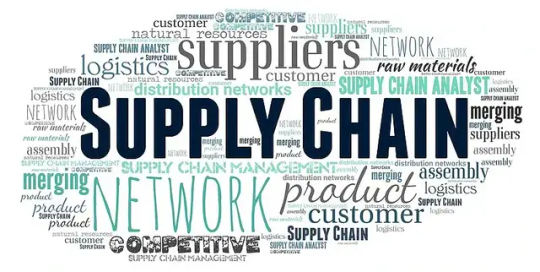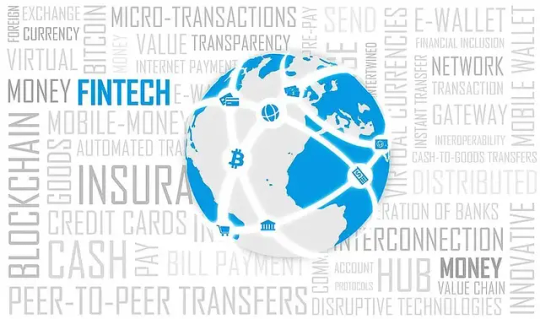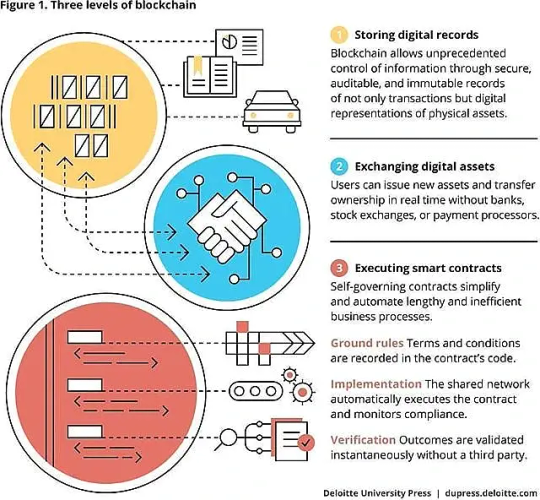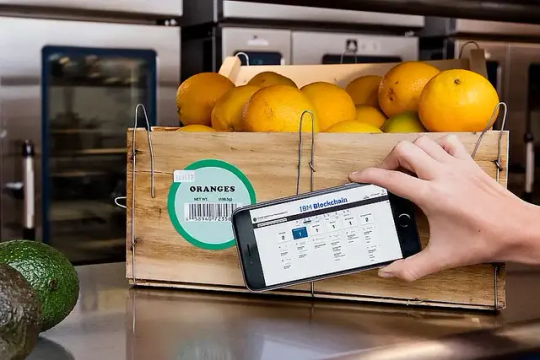#Benefitsofblockchaininsupplychain
Explore tagged Tumblr posts
Text
Unlocking the Potential of Blockchain Technology in Supply Chain Management

As businesses continue to expand globally, the need for efficient and transparent supply chain management has become more critical than ever. Traditional methods of tracking goods, inventory, and transactions are often cumbersome, prone to errors, and lack transparency. Fortunately, the advent of blockchain technology is revolutionizing how supply chains operate. By leveraging blockchain's decentralized ledger system, companies can now create a more streamlined and secure supply chain that promises to reduce costs while increasing efficiency. Please read on to find out how blockchain technology is transforming the world of supply chain management. From improving transparency in production processes to streamlining logistics and enhancing traceability across the entire supply chain network – we will examine the key benefits that blockchain technology brings to this vital industry.

Supply chain training center. Photo by NAVSUP Business Systems Center. Flickr.
Current Challenges in Supply Chain Management
Supply chain management faces several complex challenges in today's interconnected and post pandemic global market. Traditional solutions, such as manual tracking, spreadsheets, and legacy systems, are no longer efficient enough to handle the speed and complexity of modern supply chains. Let's take a closer look at the problems associated with these traditional solutions and how they impact supply chain management. 1. Inefficiency and Lack of Visibility Traditional supply chain management often relies on manual processes and paper-based documentation. This manual tracking method is time-consuming and prone to errors. Without real-time visibility into the movement of goods and inventory levels, supply chain managers struggle to make informed decisions and respond quickly to changes in demand or disruptions in the supply chain. Also, legacy systems and disparate software applications used for supply chain management can lead to data silos and poor integration. This lack of visibility across different stages of the supply chain hinders collaboration and coordination, making it difficult to optimize operations and meet customer expectations. 2. Complex and Fragmented Networks Modern supply chains involve numerous stakeholders, including suppliers, manufacturers, distributors, retailers, and logistics providers. Traditional solutions often struggle to effectively manage the complex and fragmented nature of these networks. Coordinating activities, sharing information, and ensuring seamless communication among all parties involved becomes a challenging task. Furthermore, the lack of standardized processes and data formats across different organizations within the supply chain can create compatibility issues and inefficiencies. This fragmentation hampers the ability to track and trace products, leading to delays, errors, and a higher risk of counterfeit or non-compliant goods entering the supply chain. 3. Risk and Security Concerns Traditional supply chain management solutions are susceptible to various risks, including fraud, counterfeiting, theft, and data breaches. The centralized control mechanisms employed by these solutions can be vulnerable to manipulation or unauthorized access, compromising the integrity and security of the supply chain. Moreover, the lack of transparency in traditional supply chain management creates opportunities for unethical practices and corruption. Without a reliable and verifiable system to track and authenticate the origin, quality, and movement of goods, it becomes challenging to identify and mitigate risks effectively.

Fintech-blue Block Chain Illustration. Photo by Monito. Flickr.
Exploring the Potential of Blockchain Technology
Blockchain technology offers a promising solution to address the challenges faced by traditional supply chain management. With its decentralized and transparent nature, blockchain can transform the way supply chains operate by providing enhanced visibility, efficiency, and security. By leveraging blockchain's distributed ledger system, supply chain managers can track goods from their origin through each step of the journey in real-time. The decentralized nature of blockchain eliminates the need for intermediaries, reducing costs and increasing the speed of transactions. Additionally, every transaction recorded on the blockchain is immutable, ensuring transparency and accountability throughout the supply chain. Blockchain technology enables the implementation of smart contracts, which are self-executing agreements that automatically trigger predefined actions based on predefined conditions. Smart contracts streamline processes, automate payments, and enhance trust among stakeholders. Moreover, blockchain's cryptographic algorithms and consensus mechanisms ensure the security and integrity of data within the supply chain. The decentralized nature of the ledger eliminates the risks associated with centralized control, reducing the potential for fraud, manipulation, and unauthorized access.

The three levels of Blockchain. Photo by Paula Piccard. Flickr.
What is Blockchain Technology?
Blockchain technology has become increasingly popular in recent years, but what exactly is it and how does it work? At its core, blockchain is a distributed ledger system that allows for secure and transparent record-keeping. This means that instead of relying on a central authority to verify transactions, blockchain uses a network of computers to maintain a shared database that can be accessed by anyone. One of the key advantages of blockchain technology is its ability to provide transparency and security. Because each transaction is verified by multiple nodes in the network, it becomes very difficult for any one person or entity to manipulate the data. This makes it an ideal solution for industries such as finance and healthcare where trust and accuracy are paramount. Also, because the ledger is distributed across many different nodes, there’s no single point of failure which further enhances its security. Overall, blockchain technology offers numerous benefits over traditional record-keeping systems.

Blockchain Technology Helping Packagers Improve the Supply Chain. Photo by Assemblies Unlimited, Inc. Flickr.
Benefits of Blockchain for Supply Chain Management
Blockchain technology has become a game-changer in the world of supply chain management due to its ability to enhance transparency, efficiency, and security. Traditionally, supply chain management has been characterized by various challenges such as lack of visibility into the movement of goods, delays in payment reconciliation, and susceptibility to fraud. However, blockchain technology offers a revolutionary solution by providing a decentralized system that enables secure storage and sharing of data across multiple parties. One significant benefit that blockchain brings to supply chain management is increased transparency. Transparency is vital for enhancing trust between different parties involved in the supply chain. With blockchain technology, every transaction is recorded on an immutable ledger that cannot be altered without consensus from all parties involved. This feature enables stakeholders to track their products' progress from one stage to another and locate any bottlenecks or potential weaknesses in the process easily.

IBM Blockchain addresses global food security from the hands of leading companies in food and distribution. Photo by IBM España. Flickr.
Real-world Applications of Blockchain in Supply Chain Management
Blockchain technology is rapidly gaining popularity as a tool for enhancing supply chain management and increasing transparency. Blockchain, which was initially developed for digital currencies like Bitcoin, has found its way into various industries, providing an immutable record of transactions that can be easily verified by parties involved in the supply chain process. The result is increased trust and efficiency in the supply chain. One industry that has embraced blockchain technology is the food industry. Walmart uses blockchain to track the origin of produce from farm to store shelves. This ensures that customers have access to fresh food while reducing waste and improving efficiency along the supply chain. Another industry using blockchain technology is finance, where banks use it to reduce fraud and transaction time during interbank transfers. The pharmaceutical industry has also adopted blockchain to improve transparency in drug distribution channels. Blockchain records can help prevent counterfeit drugs from entering legitimate markets, ensuring patient safety. Table: Comparison of Traditional Supply Chain Management and Blockchain Technology Aspects Traditional Supply Chain Management Blockchain Technology Transparency Limited visibility into the supply chain Real-time visibility and traceability of every transaction and product movement Efficiency Manual processes and paperwork Automated processes through smart contracts, reducing errors and delays Security Data vulnerabilities and potential for fraud Immutable records and cryptographic security, reducing the risk of fraud and counterfeiting Trust Reliance on intermediaries and information asymmetry Decentralized network and consensus mechanisms, fostering trust among participants
Conclusion
In conclusion, blockchain technology is revolutionizing the way supply chains operate. By providing transparency, security, and efficiency, it is changing the game for businesses across the globe. From reducing fraud and errors to increasing trust among stakeholders, blockchain is a powerful tool that can help organizations stay competitive in today's fast-paced economy. As more and more industries adopt this technology, we can expect to see even greater benefits in terms of cost savings, improved customer experiences, and streamlined operations. Whether you're working in logistics, manufacturing, or retail, it's time to start exploring how blockchain can help you transform your supply chain management processes. Sources: THX News & Researchgate. Read the full article
#Benefitsofblockchaininsupplychain#Blockchaintechnology#Complexsupplychainnetworks#Efficientsupplychain#Inefficiencyinsupplychain#Riskandsecurityinsupplychain#Supplychainmanagement#Supplychainvisibility#Traditionalsolutions#Transparentsupplychain
0 notes